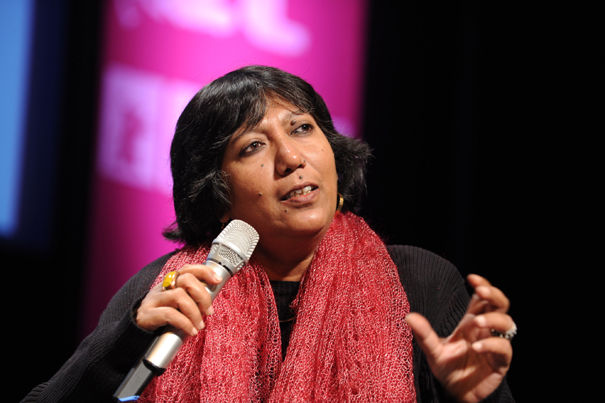Film in Collars
Not your average Indian director ─ versatile filmmaker Madhusree Dutta shares her experience on Indian cinema and the city and on alternate uses of film stocks.

Madhusree Dutta
Youthful freshness and versatility rooted in first-hand experiences are embodied in the character of Indian filmmaker, Madhusree Dutta.
“In cities that produce films on such large scales, the influence of the films is everywhere: lifestyle, fashion etc.”, states Madhusree at the “Cinema Unlimited” panel of the Berlinale Talent Campus. This is the main idea of her interdisciplinary installation project CINEMA CITY, which can be seen in the Forum expanded section of the 60th Berlinale. One of her previous feature films, MADE IN INDIA, gives us insight into the “practical” part of Bollywood. If the Indian film industry, so attached to the community around it, is the scene, then Madhusree’s film takes us behind the scenes. Her last feature film 7 ISLANDS AND A METRO is the first Indian nonfiction film to be commercially released.
Madhusree applies to her films all the fields she is engaged in: theatre, art pedagogy, literature, feminist and student movements, activism etc. Originally wanting to become an actress, she started her versatile career in theatre. She later realized, however, that the repetition that comes with plays did not satisfy her curiosity and her appetite for change. Thus she turned to filmmaking, which gives her the opportunity to blend documentary, fiction, art and all kinds of social themes and provide constant variations of these. The notions of fiction and documentary, however, can no longer be separated, notes Madhusree, and she believes these ideas should be reconsidered. The overlapping of these fields of interest and her close relation to all subjects makes her work very accurate indeed.
All these connections come down with a greater strength in India because of the social role film has in Bollywood. Films permeate everyday life there like nowhere else in the world. It is an organic part of society not only virtually but literally. Madhusree tells a story that proves this better than any academic lecture: A man who lives in a hut in the middle of Bombay gathers picture strips that were thrown away and boils them for some time. Then he erases their content and sells them. These blank films serve very nicely as collar hardeners. Not quite a bedtime story, but this is just the point, because it reflects a way of thinking that doesn’t avoid social reality.
What activists rarely admit: the fact that their deeds are motivated less by helping others and more by helping themselves comes naturally from Madhusree. The connection she makes with a person works both ways and benefits both sides. This honest and humble attitude is a rarity amongst filmmakers.


301 Moved Permanently